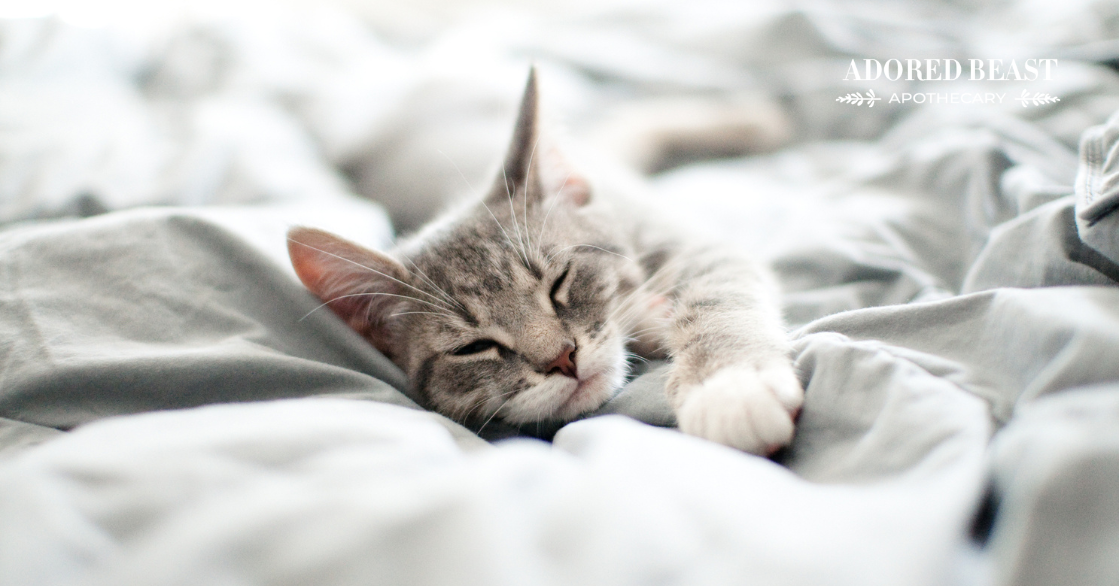Did you know that FIV in cats is one of the most common feline infectious diseases?
Have you even heard of it? We wouldn’t be surprised if you hadn’t.
Because many people are unfamiliar with this virus, an FIV diagnosis can seem daunting to any cat parent.
Thankfully, it is not common; only 1-5% of cats in North America are FIV-positive.
But it’s still important to know what it is, and to dispel some of the myths that surround it – myths that tend to make cat parents more afraid than necessary.
What is FIV in Cats?
FIV stands for feline immunodeficiency virus. It is specific to our feline companions. The virus was first recognized in the veterinary community in the mid-1970s, and has been found in cats all around the world.
In many ways, FIV in cats is similar to HIV (human immunodeficiency virus) in humans because it impacts the body in the same way – it attacks and weakens the immune system.
This means that, when a cat becomes sick, the immune system is not able to fight off infections effectively. Infections that a healthy cat would normally be able to recover from become prolonged or chronic. This means that many of the clinical signs associated with FIV are due to other non-healing infections.
Once a cat is infected with FIV, there is, unfortunately, no cure for the virus. However, experts are still not sure if all infected cats will become clinically ill. It can take weeks, months, or even years after initial infection before a cat begins to show signs.
Common clinical signs of FIV infection include:
- Gingivitis/stomatitis (inflammation of the gums and mouth)
- Weight loss
- Poor appetite
- Fever, especially fever of unknown origin
- Inflammation of the membrane around the eyes (chronic conjunctivitis)
- Swollen lymph nodes
- Vomiting and diarrhea
Most of these signs are non-specific and can be seen with many other diseases. Any cat with an illness that is persistent or recurrent should be tested for FIV.
How Do Cats Get it?
FIV is a communicable disease, meaning that it spreads from one cat to another. Cats with FIV shed the virus mainly through their saliva. Naturally occurring transmission typically occurs via one of a few routes:
- A bite – an infected cat that is actively shedding virus into the saliva bites another cat, transferring its saliva through the bite wound
- From a mother to baby during or soon after birth
- When other bodily fluids, particularly blood, enter the body
- Through sexual transmission (the risk of this is very, very low)
Bite transfers are the most common form of transmission. Because of this, it’s really important to have your cat tested if they are bitten by another cat with an unknown medical history. Do this approximately two months after the bite.
Additionally, the virus does not last long without a host, so causal transmission is very unlikely. Spread between cats through normal social contact such as grooming is also unlikely, so your other cats may be FIV-negative when tested. However, a cat that has FIV does present a risk to other cats. It’s a good idea to test your cats if one receives a diagnosis.
Note: FIV only infects cats – it is not transmissible to humans, or any other pets.
How to Support a Cat with Feline Immunodeficiency Virus
As mentioned, unfortunately, there is no cure for FIV in cats. As far as experts believe, once a cat is infected with FIV, the virus will remain for the rest of the cat’s life. That being said, cats with FIV can have a normal lifespan with excellent quality of life; however, because they are more susceptible to disease, severe illness can lead to a worse prognosis. That means you want to do everything you can to keep their health in check!
If your cat is FIV positive, you really want to make sure you’re feeding them a high-quality, moisture-rich diet full of fresh, whole foods. If you’re concerned about potential pathogens in raw food, work with a feline nutritionist to formulate a well-balanced, homemade, gently cooked diet.
Healthy supplements that can help to boost the immune system will also play an important role. Some of our recommendations include:
- Antioxidants – phytoplankton is an excellent source, of not only those critical antioxidants, but also many other bioavailable vitamins, minerals, amino acids and omegas needed to support total body health.
- Probiotics can help to regulate the immune system and give the body a better chance at fighting infection. We recommend Felix’s Flora for this, because of its benefits for gut health, its immune modulating properties, and the fulvic and humic acids that help detox your cat from things like heavy metals, toxins, and environmental pollutants that put such a strain on the body.
- Omega-3s help to strengthen cell walls, help macrophages engulf pathogens, and aid in eliciting a strong immune response, in the presence of a virus, pathogen or bacterial invasion.
- Turkey tail mushrooms also have potent immune modulating properties, as well as beneficial antioxidants. One of the best things about turkey tail is polysaccharide-K (PSK), which stimulates the immune system and can help fight off viruses. It’s also one of the most well-studied mushrooms for its anti-inflammatory and anti-cancer properties. Even more impressive is the research into how PSK can help interfere with the early stages of HIV infection (remember, HIV is very similar to FIV).
Reduce stress as much as possible. Cats are great at hiding their stress, but stress can be really bad for your cat’s health. Try to engage them (boredom = stress) both physically and mentally. Cat toys, puzzles, catnip, cat trees, and climbing walls are all different ways to engage the body and mind and reduce stress.
In fact, avoiding or eliminating all stressors in your cat’s environment is very important – not just emotional stress. If possible, flea, tick, and heartworm medications and unnecessary vaccines should be avoided for cats with FIV. Make sure all cleaning products are green and natural (not chemical-based). We also recommend an air purifier to minimize or reduce airborne pollens, molds, and toxins.
Regular visits (annually or semi-annually) with your veterinarian can also be a good idea. We highly recommend finding a holistic or integrative veterinarian. Note that these visits can be very stressful for some cats, so it’s important to try and find balance here. If your kitty gets stressed, Your Go-2 can be really helpful to take the edge off for these visits.
Remember, the risk of social, causal transmission is very low. That said, if you have a multi-cat home and would feel more comfortable, you can always give each cat their own feeding and water bowl, or even their own extra litter box. But, please don’t separate your kitties! If they’re used to being together, and suddenly they’re separated, this can be very stressful!!
An FIV diagnosis can be scary, but just remember, a cat with FIV can live a long, healthy, thriving life when given the proper support. This hasn’t changed who your cat is. Don’t let the disease define them. Diet, activity, connection, and of course love are all critical to the health and wellness of a cat with FIV, just as it is for all living beings.












